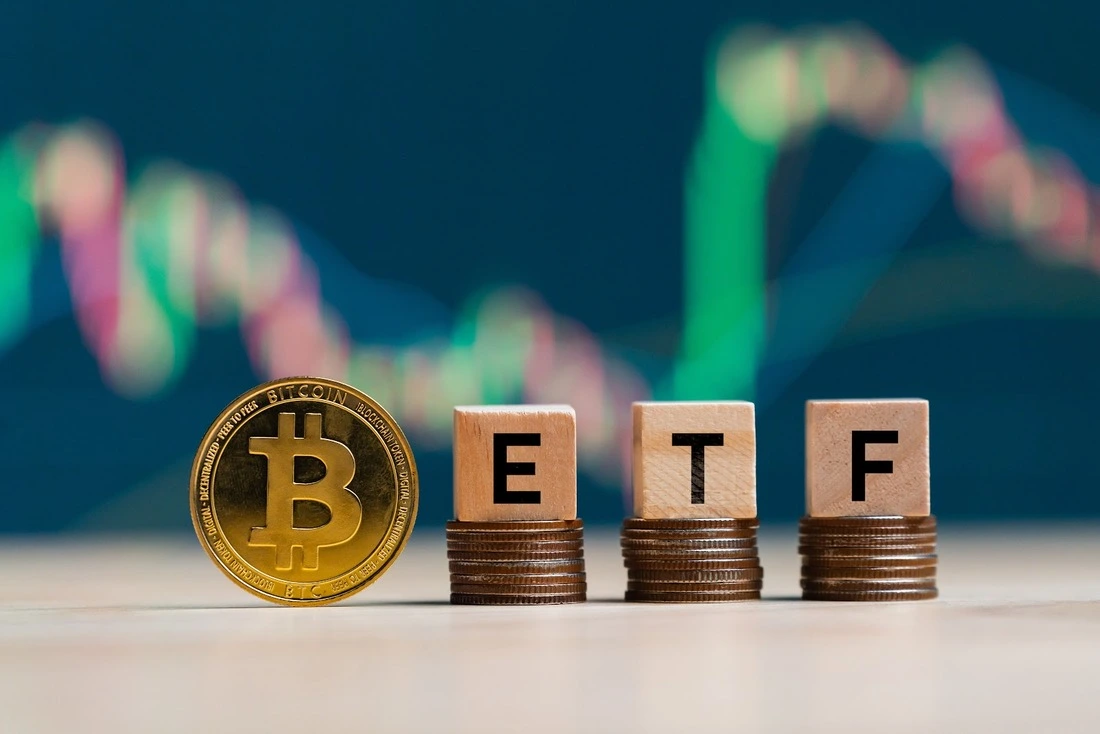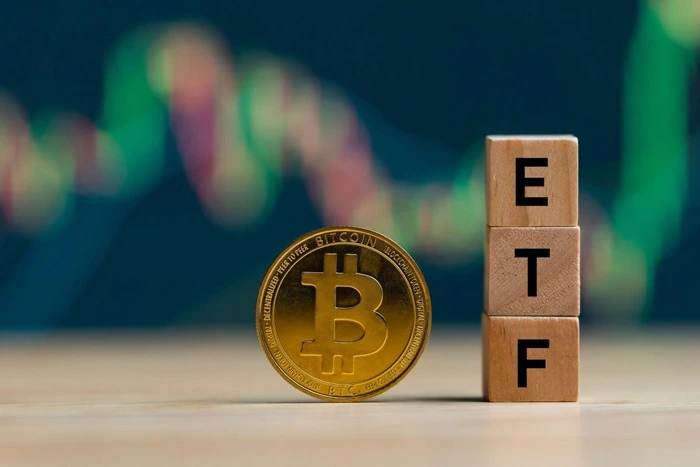Investing in cryptocurrencies comes with significant risk. You could lose all the money you invest. Please read our risk warning here.
A Bitcoin ETF is a type of investment fund that tracks the price of Bitcoin, allowing investors to buy shares in the ETF through traditional stock markets. This investment vehicle bypasses the need to directly buy, store, and manage Bitcoin, offering a bridge between conventional finance and the innovative world of cryptocurrency. But what are the mechanics behind this fusion of two distinct markets, how does it work, and what are the potential benefits and downsides? Our guide demystifies “what is a Bitcoin ETF” for the curious investor looking to explore this burgeoning domain. Expect to uncover the essentials of Bitcoin ETFs, their impact on the market, and how they fit into the broader financial landscape.
Key Takeaways
- Bitcoin ETFs provide traditional investors with exposure to Bitcoin’s price movements without the complications of direct purchase or secure storage, offering both spot price tracking through actual Bitcoin holdings and futures contract exposure.
- Investing in Bitcoin ETFs has advantages like greater accessibility and a simplified investment process, but it also carries risks such as heightened market volatility and regulatory uncertainties.
- The regulatory environment for Bitcoin ETFs is evolving, with the SEC recently approving multiple spot Bitcoin ETFs and showing signs of a more accommodating stance towards integrating cryptocurrency products within traditional financial markets.
Decoding the Bitcoin ETF: An Overview
Bitcoin ETFs, a type of exchange-traded funds (ETFs), are essentially bridges that connect traditional investors to the volatile yet lucrative world of Bitcoin. These funds offer a simplified way for investors to gain exposure to the price movements of bitcoin without the need for direct purchase or secure storage of the digital coins.
They are designed to mimic the performance of Bitcoin, the underlying asset, without the investor needing to worry about the intricacies of buying, securing, and storing Bitcoin. This eliminates the complexities of dealing with cryptocurrency exchanges, digital wallets, and private keys.
The result? A more straightforward entry point to the Bitcoin market for traditional investors.
The Mechanics of Bitcoin ETFs

Bitcoin ETFs, a type of exchange-traded fund, function through a complex yet fascinating mechanism. They are traded on established stock exchanges, much like shares of a company, and can be bought and sold using standard brokerage accounts. Their accessibility and convenience have significantly contributed to their popularity.
There are two types of Bitcoin ETFs, each with a unique operating mechanism. These are spot Bitcoin ETFs and Bitcoin futures ETFs. ETFs that hold actual Bitcoin are known as spot ETFs, while futures ETFs rely on trading futures contracts. However, they face the challenge of tracking error, causing discrepancies between the performance of the ETF and the actual movements of the Bitcoin futures market.
Types of Bitcoin ETFs: Spot vs. Bitcoin Futures ETF
Spot and futures Bitcoin ETFs offer different investment strategies to investors. Spot bitcoin ETFs are exchange-traded funds that track the spot price of bitcoin. They are backed by the actual cryptocurrency held by a custodian, providing more direct exposure to Bitcoin’s price movements.
On the other hand, a bitcoin futures ETF is a fund that gains investment exposure to the price of bitcoin through futures contracts. These are standardized agreements to buy or sell bitcoin at a predetermined future date. The primary difference between a spot and a futures bitcoin ETF is in the underlying asset - spot ETFs own the actual bitcoin, whereas futures ETFs own the underlying bitcoin futures contracts.
Depending on their investment strategies, investors might opt for spot ETFs for long-term investment or futures ETFs for short-term price speculation on cryptocurrencies.
Role of Authorized Participants
Authorized Participants (APs) play a crucial role in the functioning of Bitcoin ETFs. They are responsible for the actual mechanics of ETF share creation and redemption, which are critical for the ETF’s liquidity.
APs create new ETF shares by assembling the required basket of underlying assets or by providing the equivalent value in cash. They deliver these to the ETF in exchange for an equal number of ETF shares. They contribute to fair pricing for ETF shares by taking advantage of arbitrage opportunities. By creating and redeeming shares when there’s a discrepancy between the price of the ETF shares and the underlying assets, APs ensure ETFs trade at a price close to their net asset value (NAV), maintaining liquidity and fair pricing in the ETF market.
Depending on the structure of the particular ETF and prevailing market conditions, APs can choose to deliver the required basket of assets directly or provide a cash equivalent.
Advantages and Challenges of Investing in Bitcoin ETFs
Investing in Bitcoin ETFs comes with its fair share of advantages. They simplify the investment process by circumventing the complexities associated with managing digital wallets and navigating cryptocurrency exchanges. Bitcoin ETFs allow investors to participate in the cryptocurrency market through traditional brokerage accounts without the need for direct purchase or secure storage of the digital coins. Additionally, including Bitcoin ETFs in a portfolio can enhance diversification, potentially offering a hedge against market downturns since cryptocurrency often displays little correlation with traditional market movements.
However, it’s not all rosy. Risks abound in investing in Bitcoin ETFs, including the inherent volatility of the cryptocurrency markets, which leads to unpredictable performance and heightened investment risk. Also, despite being easier to handle than actual cryptocurrencies, Bitcoin ETFs do not offer the same control over the asset as direct cryptocurrency ownership.
Why Investors Choose Bitcoin ETFs
Several factors make Bitcoin ETFs attractive to investors. One significant reason is the convenience they offer. Bitcoin ETFs provide greater accessibility for investors, enabling them to gain exposure to bitcoin as an asset class within their budget and risk tolerance through a regulated investment vehicle. They are, therefore, a practical alternative for investors deterred by the high price of Bitcoin or who prefer not to engage in purchasing and holding cryptocurrency directly.
Additionally, Bitcoin ETFs can provide enhanced security for investors’ crypto holdings. They help mitigate issues like exchange hacks or wallet vulnerabilities that are associated with direct ownership. The entry of established funds like BlackRock’s iShares Bitcoin Trust into the bitcoin ETF market indicates a trend of mainstream financial adoption and offers investors a way to bypass the security and technical challenges of direct cryptocurrency ownership.
Risks to Consider
Despite their advantages, Bitcoin ETFs come with their share of risks. They introduce volatility and liquidity risks, subjecting investors to unpredictable market swings. Bitcoin futures ETFs, in particular, can incur additional costs from rolling over contracts that amplify the risks of bitcoin’s price volatility.
Moreover, Bitcoin futures ETFs pose significant risks for investors, including:
- Regulatory uncertainty, which can affect their legality and valuation
- Security risks due to the susceptibility of cryptocurrencies to cyber threats
- Custodianship risks: Bitcoin ETFs often depend on third-party custodians for storage.
The Landscape of Bitcoin ETFs in the Market

The landscape of Bitcoin ETFs in the market has undergone significant changes in recent years. Spot Bitcoin ETFs, which hold the actual cryptocurrency and track Bitcoin’s live market price, have recently been given the green light to trade on significant stock exchanges. The performance data for these newly approved spot Bitcoin ETFs, once available, will provide insights on market reception and influence on Bitcoin’s price stability.
The introduction of Bitcoin ETFs represents an integration of cryptocurrency investment products into the mainstream financial market, with the bitcoin etf proposal potentially signaling broader adoption and institutional interest.
Spotlight on Major Bitcoin ETFs
Several major players have emerged in the Bitcoin ETF market, including the Grayscale Bitcoin Trust. BlackRock’s iShares Bitcoin Trust (IBIT) saw a rapid accumulation of $10 billion in assets under management (AUM) within seven weeks of its launch. Following their respective launches, BlackRock’s IBIT and Fidelity’s FBTC have amassed substantial assets, with IBIT attracting $2.7 billion and FBTC gathering $2.3 billion in just the first month.
Other notable Bitcoin ETFs include the Ark/21 Shares Bitcoin Trust, which boasts a market capitalization surpassing $3.15 billion, and the Bitwise Bitcoin ETP, which has a market capitalization of $2.26 billion. As the popularity of these investment vehicles grows, the demand for a bitwise bitcoin etf, a bitcoin exchange traded fund, and a bitcoin spot etf continues to rise.
Then there’s the ProShares Short Bitcoin ETF (BITI), that offers investors an opportunity to short the cryptocurrency. These ETFs, among others, offer investors a wide range of options to gain exposure to Bitcoin.
How Bitcoin ETFs Impact the Cryptocurrency Market
The advent of Bitcoin ETFs has had a noticeable impact on the cryptocurrency market. The availability of spot bitcoin ETFs has opened up the digital asset market to a wider range of investors, presenting a simpler and perceivedly less risky investment alternative to directly buying cryptocurrencies.
The ease of investing in bitcoin via spot ETFs leads to increased demand for the cryptocurrency. This is because ETFs are required to purchase actual bitcoins from exchanges to back the ETF shares sold to investors. This surge in demand for bitcoin through ETFs can affect its price stability, with potential impacts including enhanced price stability due to broader market participation or increased volatility if demand outpaces supply.
Regulatory Framework Surrounding Bitcoin ETFs
The regulatory landscape for Bitcoin ETFs has evolved significantly over the years. The SEC has historically been skeptical about Bitcoin ETFs, with concerns centered around the potential for fraud and manipulation as the main reasons for rejection. However, developments in 2023 suggested an increased likelihood of the SEC approving a spot Bitcoin ETF, reflecting a potential shift in their regulatory approach.
As of January 2024, the SEC approved applications for multiple-spot Bitcoin ETFs, signaling an important milestone in the regulatory environment of cryptocurrency funds. The trend towards stricter regulation in other areas, like enhanced fines for insufficient controls and stronger anti-money laundering rules in the EU, may influence future regulatory actions by the SEC regarding Bitcoin ETFs.
SEC's Role in Bitcoin ETF Approval
The SEC plays a critical role in the approval of Bitcoin ETFs. It requires Bitcoin ETFs to demonstrate mechanisms to prevent fraudulent and manipulative acts and practices as part of their approval process. For detecting fraudulent or manipulative trading activities, the SEC expects Bitcoin ETFs to have agreements with significant futures markets for surveillance sharing.
The SEC had a preference for Bitcoin futures ETFs over spot Bitcoin ETFs due to lower risks of price manipulation and volatility. However, in its Bitcoin ETF approval decisions, the SEC remained neutral regarding the value or role of Bitcoin, emphasizing the importance of full disclosure for investors. It's significant to note that the SEC approved the first Bitcoin futures ETF in October 2021, which was the Proshares Bitcoin Strategy ETF.
Recent Developments in ETF Regulation
Recent developments have signaled a shift in the regulatory perspective on Bitcoin ETFs. The SEC’s approval of 11 spot bitcoin ETFs on January 10, 2024, marked a significant milestone in the cryptocurrency industry. This approval came after the SEC accelerated the review and approval process for Bitcoin ETFs, indicating no novel regulatory challenges with the proposed rule changes for listing and trading.
Court rulings, including a decision in August 2023, criticized the SEC for being ‘arbitrary and capricious’ and mandated the SEC to approve Bitcoin spot ETFs. This led to market buoyancy and regulatory advancements. The SEC’s approval of spot Bitcoin ETFs in early 2024 reflects a significant shift in regulatory perspective, considering ongoing concerns about Bitcoin but suggesting a warmer embrace of cryptocurrency products within traditional financial markets.
Investment Strategies Using Bitcoin ETFs
Bitcoin ETFs offer flexible investment strategies for both short-term trading and long-term investment. They are considered strategic for long-term investments due to the anticipation of price increases following Bitcoin halvings. However, investors have limited control over Bitcoin ETFs and must depend on the expertise and strategies of the fund managers.
Short-Term vs. Long-Term Investment Approaches
Investors can use Bitcoin ETFs for various investment approaches. The impact of Bitcoin halvings on market prices can create short-term trading opportunities for investors using Bitcoin ETFs. On the other hand, investors may be motivated to hold Bitcoin ETFs for longer periods due to expectations of Bitcoin’s long-term growth, especially following halving events.
Bitcoin ETFs offer a flexible approach to investment, accommodating diverse investment timelines and objectives. They allow investors to benefit from Bitcoin’s market dynamics in a regulated and simplified manner.
Diversifying with Bitcoin ETFs
Adding Bitcoin ETFs to an investment portfolio can facilitate diversification. They can potentially enhance returns and manage risk through exposure to cryptocurrency without necessitating direct investment. Bitcoin ETFs may include diverse asset holdings such as U.S. Treasurys along with bitcoin futures contracts, augmenting diversification benefits.
The launch of spot Bitcoin ETFs is expected to influence Bitcoin’s long-term price positively by making it more accessible and promoting broader adoption and marketplace liquidity. Authorities like Marko Zlatic posit that as spot Bitcoin ETFs cultivate increased access, particularly among generalist investors, and marketplace liquidity, Bitcoin prices are likely to be propelled upward over time.
Fees and Costs Associated with Bitcoin ETFs
Investing in Bitcoin ETFs comes with various fees and costs. Bitcoin ETF management fees vary, with some as low as 0.19% and others as high as 1.50%, influencing the choice of investors looking for cost-effective options. Investors may encounter higher costs with Bitcoin ETFs due to expense ratios, which can surpass the transaction fees typically experienced on cryptocurrency exchanges.
Bitcoin futures ETFs incur additional costs, such as roll premiums. Together with management fees, these can affect the overall performance and returns of the investment. On the bright side, to attract initial investment, some Bitcoin ETFs may offer temporary fee waivers or reductions.
The advent of spot Bitcoin ETFs has initiated price competition, leading to lower fees.
Alternatives to Bitcoin ETFs

While Bitcoin ETFs present a convenient investment option, they aren’t the only way to gain exposure to the cryptocurrency sector. There are several alternatives available for investors. Besides traditional Bitcoin ETFs, investors can gain exposure to the cryptocurrency sector through blockchain-focused ETFs. These include businesses related to cryptocurrency like bitcoin miners and companies actively engaging with blockchain technology.
Markets on a global scale offer various cryptocurrency exchange-traded products (ETPs). These include:
- ETFs that provide exposure to a range of cryptocurrencies, not limited to bitcoin
- Bitcoin mining stocks
- Mutual funds that hold crypto assets
- Directly investing in digital currencies
These alternative investment vehicles provide opportunities for cryptocurrency exposure.
Comparing Bitcoin ETFs and Crypto Exchanges
When deciding between Bitcoin ETFs and crypto exchanges, several factors come into play. Bitcoin ETFs streamline the investment process, reducing the complexities and enhancing security for individuals compared to buying and managing cryptocurrencies directly. They allow investors to use traditional brokerage accounts to trade Bitcoin ETFs, offering convenience and simplicity. This contrasts with crypto exchanges, which offer direct ownership with increased control over cryptocurrency investments.
However, while Bitcoin ETFs offer convenience, they typically come with higher fees than crypto exchanges, reflecting a trade-off between ease of investment and cost. Additionally, cryptocurrency exchanges allow trading at any time of the day or night, unlike Bitcoin ETFs, which are subject to regular stock market trading hours.
Beyond Bitcoin: Exploring Other Crypto Funds
In the world of cryptocurrencies, Bitcoin isn’t the only player. Following the approval of spot Bitcoin ETFs, the financial industry is exploring the potential for spot ETFs that focus on other cryptocurrencies, such as Ethereum.
This presents exciting opportunities for investors looking to diversify their cryptocurrency portfolios beyond Bitcoin.
Summary
Bitcoin ETFs have carved a niche for themselves in the financial market, providing a bridge between traditional finance and the world of cryptocurrencies. They offer a simplified investment process, accessibility, and security. However, they come with their share of risks and costs, and it’s essential for investors to understand these before diving in. With recent developments in the regulatory landscape and the emergence of spot Bitcoin ETFs, the future of Bitcoin ETFs looks promising. As the financial world continues to evolve, one thing is certain: Bitcoin ETFs are here to stay!
Frequently Asked Questions
What is a Bitcoin ETF?
A Bitcoin ETF is an investment fund that tracks the price of Bitcoin and can be traded on traditional stock exchanges, allowing investors to gain exposure to Bitcoin without owning the cryptocurrency directly.
What is the difference between Spot Bitcoin ETFs and Futures Bitcoin ETFs?
The main difference between spot and futures Bitcoin ETFs is the underlying assets they hold. Spot ETFs hold actual Bitcoin and track its live market price, while futures ETFs gain investment exposure to Bitcoin's price through futures contracts.
What are some of the advantages of investing in Bitcoin ETFs?
Investing in Bitcoin ETFs provides greater accessibility, convenience, enhanced security, and diversification for your investment portfolio, making it a promising option for many investors.
What are the risks associated with investing in Bitcoin ETFs?
Investing in Bitcoin ETFs carries risks such as volatile market conditions, liquidity concerns, regulatory uncertainty, and vulnerability to cyber threats. It's important to carefully consider these factors before making investment decisions.
What are some alternatives to Bitcoin ETFs?
Consider investing in blockchain-focused ETFs, global cryptocurrency ETPs, bitcoin mining stocks, mutual funds holding crypto assets, or directly in digital currencies as alternatives to Bitcoin ETFs. These options provide diverse exposure to the cryptocurrency market without the need for a Bitcoin-specific ETF.








